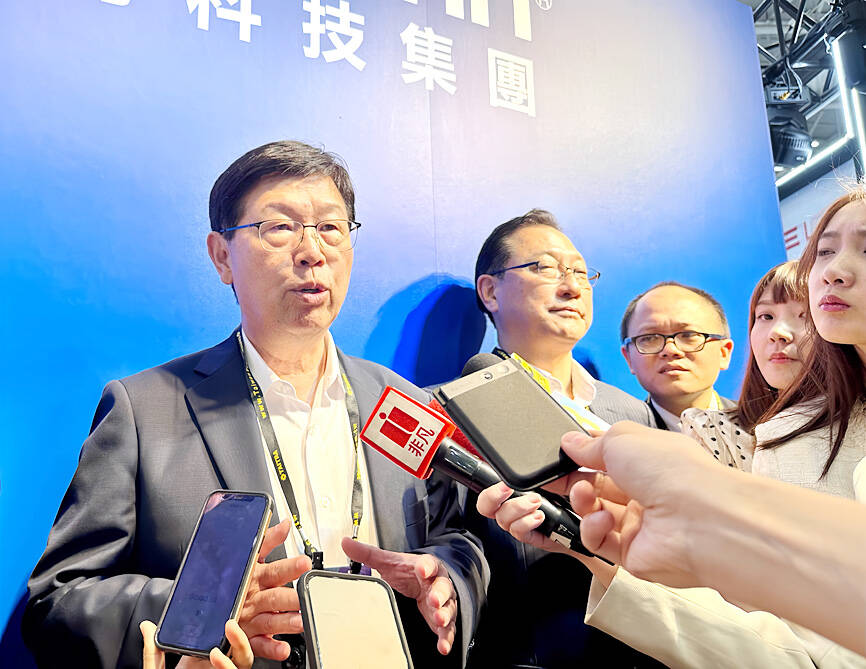Hon Hai Precision Industry Co (鴻海精密), a major iPhone assembler and supplier of artificial intelligence (AI) servers powered by Nvidia Corp’s chips, yesterday said it has introduced a rotating chief executive structure as part of the company’s efforts to cultivate future leaders and to enhance corporate governance.
The 50-year-old contract electronics maker reported sizable revenue of NT$6.16 trillion (US$189.67 billion) last year. Hon Hai, also known as Foxconn Technology Group (富士康科技集團), has been under the control of one man almost since its inception.
A rotating CEO system is a rarity among Taiwanese businesses.

Photo: Fang Wei-jei, Taipei Times
Hon Hai has given leaders of the company’s six core business groups the responsibility to oversee all business groups for six months at a time, Hon Hai chairman and CEO Young Liu (劉揚偉) told reporters on the sidelines of the Taipei International Automobile Electronics Show at the Taipei Nangang Exhibition Center’s Hall 1.
“Every company that aims for a sustainable operation would definitely need a succession plan to support that goal,” Liu said. “This CEO rotation arrangement has several benefits. The system helps our future CEOs better prepare for the job and gives them a view of how the company operates.”
Liu, 68, adopted the dual role of Hon Hai chairman and CEO when he succeeded company founder Terry Gou (郭台銘) in 2019.
Such a dual-responsibility role is commonly seen in Taiwanese companies, but it is different from common practices in the US and Europe, where the chairman’s primary role is to lead the board, while the CEO’s job is to manage the company. Foreign fund managers own 40 percent of Hon Hai’s shares.
Hon Hai has divided its businesses into six groups: smartphones, notebook computers, precision components, PCs and displays, TVs and game consoles, and semiconductors.
Commenting on the global electric vehicle industry’s volatility and a price war in China, Liu said Hon Hai would stick to its goal of seizing a 5 percent share of the global market next year.
“As entry barriers ease, more players are joining this game. This is foreseeable. But it is happening sooner than we expected,” Liu said. “We will benefit from this trend, given our new business model.”
Hon Hai seeks to manufacture TVs for other companies on a contract basis, hoping to duplicate its success in providing electronics manufacturing services for Apple and other electronic brands.
Any escalation in the Middle East would have a major impact on the world as it has caused a stock rout on TAIEX on Monday, Liu said.
“The war is not as far as you might think,” he said.

SETBACK: Apple’s India iPhone push has been disrupted after Foxconn recalled hundreds of Chinese engineers, amid Beijing’s attempts to curb tech transfers Apple Inc assembly partner Hon Hai Precision Industry Co (鴻海精密), also known internationally as Foxconn Technology Group (富士康科技集團), has recalled about 300 Chinese engineers from a factory in India, the latest setback for the iPhone maker’s push to rapidly expand in the country. The extraction of Chinese workers from the factory of Yuzhan Technology (India) Private Ltd, a Hon Hai component unit, in southern Tamil Nadu state, is the second such move in a few months. The company has started flying in Taiwanese engineers to replace staff leaving, people familiar with the matter said, asking not to be named, as the

The prices of gasoline and diesel at domestic fuel stations are to rise NT$0.1 and NT$0.4 per liter this week respectively, after international crude oil prices rose last week, CPC Corp, Taiwan (台灣中油) and Formosa Petrochemical Corp (台塑石化) announced yesterday. Effective today, gasoline prices at CPC and Formosa stations are to rise to NT$27.3, NT$28.8 and NT$30.8 per liter for 92, 95 and 98-octane unleaded gasoline respectively, the companies said in separate statements. The price of premium diesel is to rise to NT$26.2 per liter at CPC stations and NT$26 at Formosa pumps, they said. The announcements came after international crude oil prices

DOLLAR SIGNS: The central bank rejected claims that the NT dollar had appreciated 10 percentage points more than the yen or the won against the greenback The New Taiwan dollar yesterday fell for a sixth day to its weakest level in three months, driven by equity-related outflows and reactions to an economics official’s exchange rate remarks. The NT dollar slid NT$0.197, or 0.65 percent, to close at NT$30.505 per US dollar, central bank data showed. The local currency has depreciated 1.97 percent so far this month, ranking as the weakest performer among Asian currencies. Dealers attributed the retreat to foreign investors wiring capital gains and dividends abroad after taking profit in local shares. They also pointed to reports that Washington might consider taking equity stakes in chipmakers, including Taiwan Semiconductor

A German company is putting used electric vehicle batteries to new use by stacking them into fridge-size units that homes and businesses can use to store their excess solar and wind energy. This week, the company Voltfang — which means “catching volts” — opened its first industrial site in Aachen, Germany, near the Belgian and Dutch borders. With about 100 staff, Voltfang says it is the biggest facility of its kind in Europe in the budding sector of refurbishing lithium-ion batteries. Its CEO David Oudsandji hopes it would help Europe’s biggest economy ween itself off fossil fuels and increasingly rely on climate-friendly renewables. While